Kia And The Waste Lab Partnership Achieves Significant Reduction In Food Waste And CO2 Emissions

Kia Corporation partnered with Dubai-based start-up, The Waste Lab, and successfully achieved a substantial reduction in food waste, carbon emissions during a three-stage GCC-based campaign launched during the month of Ramadan – from March 22 to April 19.
The composting initiative by The Waste Lab created local resources that promote food security and a culture of home-based plant growth. This successful, impact-driven initiative prevented 2,675 kilograms of CO2 emissions by diverting 2,326 kilograms of food scraps, which is equivalent to preserving 1,370 liters of gasoline, saving 10,700 kilometers of driving, or not charging 325,412 smartphones. The initiative also produced an estimated 698 kilograms of compost.
The partnership utilized Kia’s sustainable mobility solutions, providing The Waste Lab with several hybrid vehicles – Kia Niro Hybrid in the UAE, Kia K5 Hybrid in Oman, and Kia K8 Hybrid in Saudi Arabia – in line with Kia’s vision to become a sustainable mobility solutions provider. The Waste Lab used a data tracking and routing system to facilitate the collection process, separating organic waste at the source to produce valuable compost.
Yaser Shabsogh, Chief Operating Officer, Regional HQ, Middle East & Africa, Kia, commented, “Our successful partnership with The Waste Lab aligns with Kia’s deep-seated commitment to reducing our carbon footprint and pursuing innovative means to achieve sustainable solutions. By supporting this initiative, we hope to inspire local communities to embrace responsible consumption and shift their mindset around food waste. Our goal is to help bring the cycle of life full circle and transform our world for the better.”
The Waste Lab is a women-led, impact-driven startup based in the UAE, with a mission to reduce and repurpose food waste.
Lara Hussein and Ceylan Uren, The Waste Lab co-founders added: “With the support of Kia, we were able to achieve a significant reduction in food waste and carbon emissions. This initiative not only helped divert food scraps from landfills, but also created nutrient-rich compost, promoting a culture of home-based plant growth and contributing to food security. We are grateful for Kia’s collaboration and look forward to continuing our efforts to reduce food waste and create a positive impact on our world. Through this partnership, we hope to inspire others to join us in our mission to promote responsible consumption and sustainability.”



